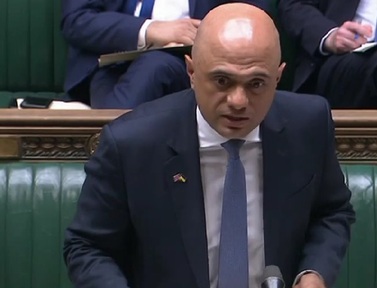Sajid Javid denies 'permanent crisis' as care shortages stall hospital discharges
The Secretary of State for Health and Social Care Sajid Javid has rejected the idea that the NHS is in “permanent crisis” because of a lack of social care, despite tens of thousands of medically-fit people being stuck in hospital.

More than 20,000 patients could not be discharged from hospital last week despite being fit to leave, because there was no care available for them in the community.
The knock-on effect is, some 22,000 patients wait more than 12 hours in A&E each month. NHS figures reveal A&E waits and ambulance delays during March were the worst ever with over 390,000 people with life-threatening conditions such as strokes, forced to wait more than an hour for an ambulance.
Not just a 'winter crisis’
In the House of Commons on Monday (19 April), Mr Javid was confronted by Labour MP Wes Streeting (Ilford North) who told him: “The government’s failure to fix the social care crisis is causing huge pressures on the NHS.
“We’re used to hearing about a winter crisis but isn’t it the case that after more than a decade of under investment in the NHS, a failure to fix social care and the absence of a plan to even address the staffing challenge in the NHS or in social care, we don’t just have a winter crisis, we have a permanent crisis in the NHS?”
Sajid Javid: ‘That’s not the case at all’
In response to the criticism, Mr Javid said: “That’s not the case at all”.
In his defence, the minister highlighted “record funding” given by government for social care and emphasised “a necessity for infection protection controls” in care settings, despite the fact that he scrapped the care sector's infection control fund at the start of April.
Mr Javid said: “The NHS and social care are facing unprecedented pressure because of the pandemic.”
Referring to Mr Streeting, Mr Javid said: “He will know, as a result of the pandemic, that both in NHS settings and in adult social care there has been a necessity for infection protection controls. He will know that staff absences are sadly higher than they have been in normal times.
“But the NHS is stepping forward with their colleagues in adult social care to provide whatever support that they can bring. Especially with the record funding that the government is providing.“
Health officials have reportedly asked care providers to do 'everything you can' to help with hospital discharges, even if that means spreading care thinly among large numbers, according to leaked correspondence seen by the Telegraph.
Figures published by Skills for Care reveal vacancy rates across social care services topped 10 per cent in March 2022, compared to 5.9 per cent in 2021.
Funding loss creates 'danger' Covid-positive care staff will work
Care home providers have called on Mr Javid to reinstate the Infection Control Fund which had been available during the pandemic up until the end of March.
Mike Padgham, chair of the Independent Care Group (ICG), which represents care providers, has warned Mr Javid’s decision to ditch the infection control fund could have “dire consequences” for people’s care.
The care leader said the fund played a “vital part” in helping care providers in care homes and home care agencies cope with staff absences caused by Covid.
Mike Padgham said: “Because the Infection Control Fund has stopped, care providers are no longer able to pay those staff for the three days’ sickness that have to elapse before Statutory Sick Pay (SSP) from the government kicks in.
“Because of the tight margins the majority of providers operate under, they cannot make up the shortfall."
The ICG chair said that as a result, there is a “very real danger” that some staff are choosing to come to work, if they have Covid, because they cannot afford not to be paid.
The care leader added: “The country cannot afford further damage to social care providers at a time when hospitals are bursting at the seams.
“A loss of social care provision has dire consequences for NHS care, delaying hospital discharges and adding to the risk of hospitals being overwhelmed this spring and summer.”
Latest News
 29-Jul-24
Dementia Bus gives carehome.co.uk staff insight into life with dementia
29-Jul-24
Dementia Bus gives carehome.co.uk staff insight into life with dementia
 01-Mar-24
Find out the top care homes in 2024
01-Mar-24
Find out the top care homes in 2024
 21-Mar-23
UK's top care homes in 2023 revealed
21-Mar-23
UK's top care homes in 2023 revealed
 03-Jan-23
carehome.co.uk launches free care helpline
03-Jan-23
carehome.co.uk launches free care helpline
 13-Dec-22
5 mins with Emily Whitehurst, chief operating officer for Constantia Healthcare
13-Dec-22
5 mins with Emily Whitehurst, chief operating officer for Constantia Healthcare